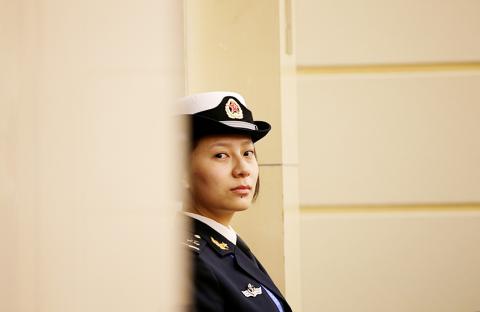China is to show off new warships, including nuclear submarines and destroyers, at a parade on Tuesday marking 70 years since its navy’s founding, a senior commander said yesterday, as Beijing flexes its increasingly well-equipped military muscle.
Chinese President Xi Jinping (習近平) is overseeing a sweeping plan to refurbish China’s military by developing everything from stealth jets to aircraft carriers as China ramps up its presence in the South China Sea and around Taiwan.
The Chinese People’s Liberation Army Navy (PLAN) has been a key beneficiary of the modernization plan, as China looks to project power far from the country’s shores, and protect its trading routes and citizens overseas.

Photo: Reuters
Beijing last month unveiled a target of a 7.5 percent rise in defense spending for this year, a slower rate than last year, but still outpacing China’s economic growth target.
PLAN Vice Admiral Qiu Yanpeng (邱延鵬) told reporters in the eastern city of Qingdao that Tuesday’s naval parade — likely to be overseen by Xi himself, although China has not confirmed that — would feature 32 vessels and 39 warplanes.
“The PLAN ships and aircraft to be revealed are the Liaoning aircraft carrier, new types of nuclear submarines, new types of destroyers, as well as fighter aircraft,” Qiu said, without giving details. “Some ships will be revealed for the first time.”
It is not clear if China’s second carrier, an as-yet unnamed ship developed and built purely in China, is also to take part, but in the past few days, state media have run stories praising recent sea trials.
About a dozen foreign navies are also taking part. While Qiu did not give an exact number, China has announced the parade would include ships from Russia, Singapore, India, Thailand and Vietnam.
Vietnam frequently complains of Chinese military activity in the disputed South China Sea, where Taiwan also has claims.
China’s last naval battles were with the Vietnamese in the South China Sea, in 1974 and 1988, although these were relatively minor skirmishes.
Qiu reiterated China’s frequent stance that its armed forces are not a threat to anyone.
“It is fair to say that the PLAN has not brought war or turbulence to any place,” but China has been scarred by its past and needs good defenses, Qiu said.
“A strong navy is essential for building a strong maritime country,” Qiu said. “From 1840 to 1949, China was invaded by foreign powers from the sea more than 470 times, which caused untold suffering and deep wounds to the Chinese nation.”

A magnitude 7.0 earthquake struck off Yilan at 11:05pm yesterday, the Central Weather Administration (CWA) said. The epicenter was located at sea, about 32.3km east of Yilan County Hall, at a depth of 72.8km, CWA data showed There were no immediate reports of damage. The intensity of the quake, which gauges the actual effect of a seismic event, measured 4 in Yilan County area on Taiwan’s seven-tier intensity scale, the data showed. It measured 4 in other parts of eastern, northern and central Taiwan as well as Tainan, and 3 in Kaohsiung and Pingtung County, and 2 in Lienchiang and Penghu counties and 1

A car bomb killed a senior Russian general in southern Moscow yesterday morning, the latest high-profile army figure to be blown up in a blast that came just hours after Russian and Ukrainian delegates held separate talks in Miami on a plan to end the war. Kyiv has not commented on the incident, but Russian investigators said they were probing whether the blast was “linked” to “Ukrainian special forces.” The attack was similar to other assassinations of generals and pro-war figures that have either been claimed, or are widely believed to have been orchestrated, by Ukraine. Russian Lieutenant General Fanil Sarvarov, 56, head

‘POLITICAL GAME’: DPP lawmakers said the motion would not meet the legislative threshold needed, and accused the KMT and the TPP of trivializing the Constitution The Legislative Yuan yesterday approved a motion to initiate impeachment proceedings against President William Lai (賴清德), saying he had undermined Taiwan’s constitutional order and democracy. The motion was approved 61-50 by lawmakers from the main opposition Chinese Nationalist Party (KMT) and the smaller Taiwan People’s Party (TPP), who together hold a legislative majority. Under the motion, a roll call vote for impeachment would be held on May 19 next year, after various hearings are held and Lai is given the chance to defend himself. The move came after Lai on Monday last week did not promulgate an amendment passed by the legislature that

FOREIGN INTERFERENCE: Beijing would likely intensify public opinion warfare in next year’s local elections to prevent Lai from getting re-elected, the ‘Yomiuri Shimbun’ said Internal documents from a Chinese artificial intelligence (AI) company indicated that China has been using the technology to intervene in foreign elections, including propaganda targeting Taiwan’s local elections next year and presidential elections in 2028, a Japanese newspaper reported yesterday. The Institute of National Security of Vanderbilt University obtained nearly 400 pages of documents from GoLaxy, a company with ties to the Chinese government, and found evidence that it had apparently deployed sophisticated, AI-driven propaganda campaigns in Hong Kong and Taiwan to shape public opinion, the Yomiuri Shimbun reported. GoLaxy provides insights, situation analysis and public opinion-shaping technology by conducting network surveillance